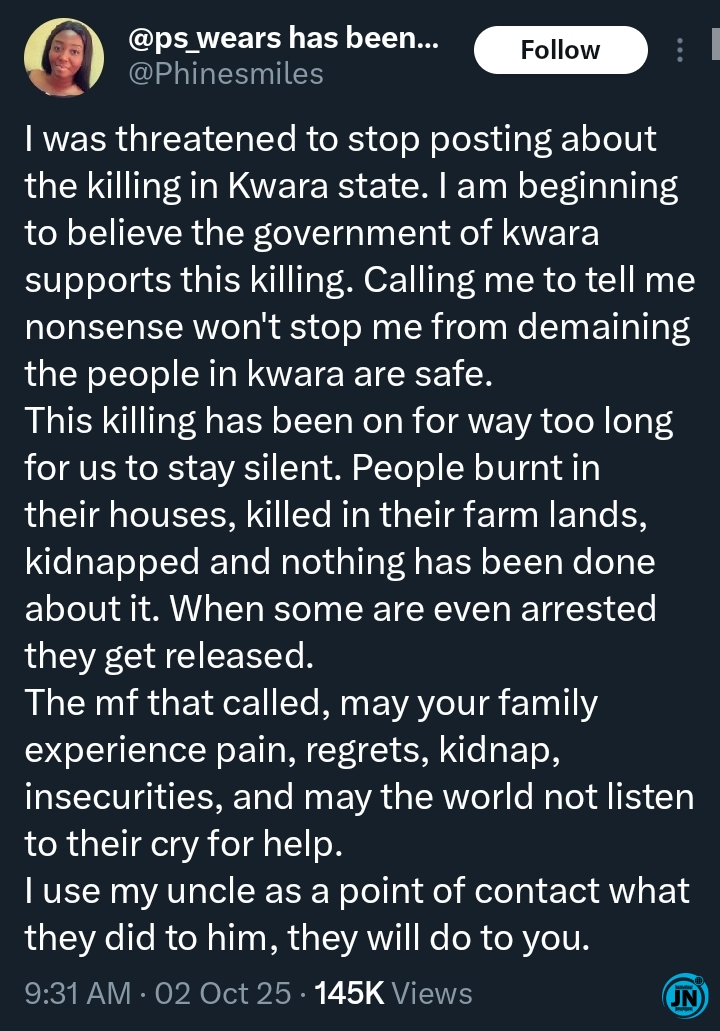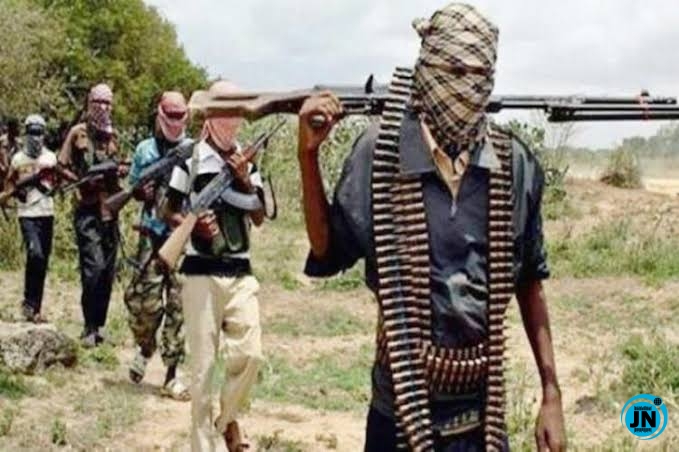A Nigerian lady has triggered widespread reactions across social media after making a bold revelation that she was allegedly threatened and pressured to stop posting about the killings happening in Kwara State. Her disclosure has brought renewed attention to the disturbing insecurity in the region and has sparked conversations about freedom of speech, government responsibility, and the safety of citizens who speak out publicly on sensitive issues.
Lady alleges threats over her posts
The lady, identified on X (formerly Twitter) as Phinesmile, revealed that she received direct calls warning her to discontinue her activism and public commentary on the rising wave of killings in Kwara. In her lengthy post, she expressed deep concern over the situation and accused certain authorities of complicity in the ongoing violence.
She wrote: “I was threatened to stop posting about the killing in Kwara state. I am beginning to believe the government of Kwara supports this killing. Calling me to tell me nonsense won’t stop me from demanding the people in Kwara are safe.
“This killing has been on for way too long for us to stay silent. People burnt in their houses, killed in their farm lands, kidnapped and nothing has been done about it. When some are even arrested, they get released.”
She continued in anger: “The mf that called, may your family experience pain, regrets, kidnap, insecurities, and may the world not listen to their cry for help. I use my uncle as a point of contact — what they did to him, they will do to you.”

Her outburst quickly gained attention online, with many Nigerians debating whether her claims highlight the dangers of political intimidation or the risks of openly confronting insecurity in the country. While some sympathized with her pain, others cautioned her to stay safe and avoid unnecessary exposure to danger.
Reactions trail her allegations
Her revelation triggered diverse reactions from social media users. Some strongly backed her courage, while others felt she should be more strategic in how she voices her frustrations. The debate reflected the larger dilemma many Nigerians face — the fear of speaking out against violence and injustice, versus the need to hold leaders accountable.
[/p]A user identified as Big Balls commented: “Sometimes you may be doing the right thing at the wrong time. We should be tactful and discreet when posting about certain things…the country is not in the best position now and we all know what Elections in Nigeria involve. I think we should consider a lot of things and wait for the security officials to take action and give report before we make conclusions which may be wrong. Ire oo!”
Another user, Jabari, however, was more confrontational, writing: “It seems those running the affairs of Kwara State are rogues, misfits and bunch of insatiable criminals. Else, how do you explain the series of tweets by different handles alleging the same pattern of threats for speaking out about killings and calculated massacre in some parts of the State, and their demand for proactive government action! How unfortunate can this get?”

Historical warning cited
Adding to the ongoing conversation, another commentator recalled a famous warning by Nigeria’s late military ruler, General Sani Abacha, who once said: “Any insurgency that lasts more than 24 hours, the government has a hand in it.” Many Nigerians echoed this statement, suggesting that the long-running insecurity in Kwara may point to negligence, complicity, or systemic failure on the part of leaders.
The user, identified as A simple man, wrote: “Don’t let them silence you. Kwara State government is very complicit in these killings and they must pay for it.”
Ongoing concerns
The discussion has reignited wider concerns about the deteriorating security situation in parts of Kwara State, where residents have reportedly faced recurring incidents of mass killings, arson, kidnappings, and destruction of farmland. Many argue that these issues have persisted far too long without adequate government intervention, leaving citizens to fend for themselves amid fear and uncertainty.
[/p]Despite repeated calls for action, critics insist that authorities have failed to adequately respond, fueling suspicions that the silence of government officials points to deliberate negligence. As the outrage continues to build online, Nigerians are demanding urgent steps to restore safety, protect whistleblowers, and ensure accountability for those threatening citizens who dare to speak out.